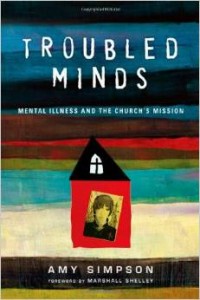 Mental illness and the church, not many people are talking about this issue, but it is real and it is affecting individuals and churches all across the landscape of Christianity. In my own church, mental illness is a normal reality with which we wrestle on a regular basis. We have many young people and adults who wrestle with the challenges that accompany bipolar disorder, eating disorders, obsessive compulsive disorder, ADHD, autism, depression, and a wide spectrum of other mental health challenges. Our church has become a sort of sounding board for people with struggles, and by trial and error, I have learned a lot about counseling people with these struggles. I’ve also learned that people struggling with mental illness really need the love and acceptance of a good church.
Mental illness and the church, not many people are talking about this issue, but it is real and it is affecting individuals and churches all across the landscape of Christianity. In my own church, mental illness is a normal reality with which we wrestle on a regular basis. We have many young people and adults who wrestle with the challenges that accompany bipolar disorder, eating disorders, obsessive compulsive disorder, ADHD, autism, depression, and a wide spectrum of other mental health challenges. Our church has become a sort of sounding board for people with struggles, and by trial and error, I have learned a lot about counseling people with these struggles. I’ve also learned that people struggling with mental illness really need the love and acceptance of a good church.
It is because of my personal experience with these issues that I felt compelled to read Troubled Minds by Amy Simpson. Honestly, I didn’t want to read this book, I read it out of duty. Duty to review it because IVP mailed to to me for a review and a sense of duty to my church. Surprise of all surprises, I enjoyed this book. I devoured it. I read the first 100 pages in one sitting. The story of Simpson’s life struggles with mental illness is compelling and captivating and her willingness to wrestle with the church’s response to this issue is needed and necessary.
The book is not perfect and there were some areas that I wish she had handled differently. For instance, she spends nearly 20 pages identifying and explaining various disorders as they are defined in the DSM. I found this to be unnecessary and unhelpful as anything other than a filler in the book (I skimmed it). Further, I was bothered that she appealed to the DSM regularly throughout the book without offering any criticism to the DSM or the process through which it is created and edited (In a 42 year period the DSM grew by 340% increase in disorders, you can also see criticism at Psychology Today for the DSM V).
Simpson seems to have a high view of psychology, psychiatry, professional counseling and social work, but a low view of a pastor’s ability to successfully counsel with those afflicted with mental illness. On page 129 she writes,
For church leaders with Bible college and seminary degrees, mental illness is as much a mystery as it is for lawyers, librarians and lumberjacks. Very few pastors have degrees in counseling or social work, and even fewer happen to be psychiatrists.
This is a very unfortunate paragraph. As a pastor, there have been times that I have been overwhelmed in counseling and have needed to turn to others for help and even to refer people for more counseling. I have often turned to my wife (who happens to have a masters degree in social work) to assist me in counseling, but by and large, I have found my seminary training to be very effective in helping me to provided biblical counsel to those who are struggling. As it relates to biblical counseling, Angela and I both agree that my training in seminary has been invaluable and is in no way inferior to her secular training as a social worker. I applaud Simpson for encouraging pastors to know their limitations and being willing to seek outside counsel, but I also feel confident that those who were trained in the same ways I was trained are qualified to offer biblical counseling to the suffering.I’m afraid that by downplaying the pastor’s ability and role in counseling, Simpson may discourage people who are suffering to avoid their pastor, this would be unfortunate.
Though I have criticisms (a few more that I mentioned) I would recommend this book highly. Simpson’s greatest encouragement through this work is to bring mental illness out of the shadows in the church and to call the church to respond with love and grace to those who are suffering. She calls the church to be the church for the mentally ill just as we are to those who are suffering with cancer or heart disease. She also calls on the church to come along side the families of those suffering and to provide support and care. Many of those she interviewed seemed genuinely appreciative just knowing that people cared enough to ask them questions.
We have many in our church who struggle through mental health issues personally and within their families. I have been blessed and amazed to see how much healing is possible when the sects about mental health issues are brought into the light of God’s church family. I’ve also been blessed to see how much I am learning from those who struggle with mental illness. Churches need to wake up to the needs of mental illness, and this book is a great way to sound the wake-up call.
